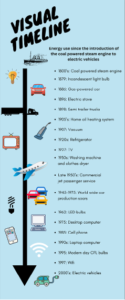Background Information

History of Energy:
Every day, our lives depend on energy use — for transportation, the food we eat and how we prepare it, the homes we live in, the products we use, and many other comforts. Energy consumption has grown and continues to grow exponentially. While energy is a necessary part of modern living, we must transition to clean, renewable sources so that we can mitigate rising temperatures due largely to CO2 emissions. Fossil fuels still comprise the vast majority of our energy today. Our reliance on coal, oil, and gas — energy sources that are non-renewable — causes increased CO2 emissions and accelerates climate change.
For most of human history, work was done with muscle power, either by humans or non-human animals like horses. Eventually, fire was discovered and humans relied on it as a primary energy source for warmth and cooking food. The burning of biomass — solid fuels such as wood, waste from crops, and charcoal — was the primary energy source around the world for much of the early part of humankind. The need for energy increased exponentially with our increased technological innovations and resulting transportation and industrial activities. In the mid 1700s, the Industrial Revolution brought about the reliance on coal for energy. It was used heavily during this time and enabled further transport of both people and goods. Oil and gas were discovered soon after and became increasingly in-demand, especially with the introduction of the automobile in the 1900s, which became increasingly cheap and mass-produced, further increasing the need for fossil fuels. The addition of hydropower followed, and in the 1960s, nuclear power was introduced. While renewable sources have always been used in varying capacities — from windmills to water mills to passive solar — it wasn’t until the late 1980s that they became a more viable energy source with slow but increasing adoption.
This content is restricted to subscribers only.
If you are not yet a subscriber, please consider taking out a subscription here.
If you are an existing subscriber, kindly log in or contact us at info@greenteacher.com for more information.





